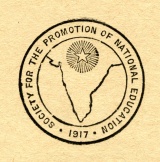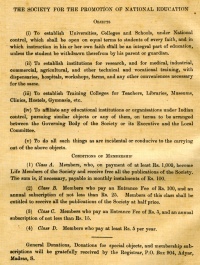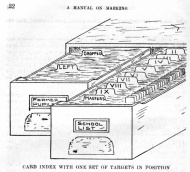Society for the Promotion of National Education
The Society for the Promotion of National Education (SPNE) was an organization established in 1916 in India to support the development of schools based in Indian languages, religions, and customs. Staff and members of the Theosophical Society based in Adyar, Chennai, India were heavily engaged in every aspect of SPNE's operation, although the two organizations were not legally connected. The participants were motivated by the desire to serve the Indian people and to prepare India to prepare for independence. In 1924, the SPNE closed, and merged into the Theosophical Educational Trust.[1]
Objects and membership
The Society stated five objects, as shown in the image at the right. The founders wished to establish universities, colleges, and schools that would be open to students of all religions. The students were to be instructed in their own religions, as an integral part of their education. Research institutions, technical and vocational schools, and teacher training were all to be established, along with any necessary support facilities.
Members of the Society belonged to four classes based on varying levels of entrance fees and annual subscriptions. The only qualifications for membership were financial; the Society was not exclusive, so gender, race, and nationality were not considered.
Additional financial support for the Society came from fundraising efforts. Membership was managed by the Registrar of the SPNE, who was George S. Arundale.
History
The growth of the Society was greatly accelerated by an action of Theosophical Educational Trust. At its annual meeting on December 27, 1916, the Trust "resolved to make a present to the Society of its colleges and schools as far as possible." TS President Annie Besant was given authority to determine when and how the educational institutions should be transferred to the governance of the Society. "By thus immolating itself upon the altar of the National need the Trust gave the lead and supplied that spiritual note which must be and is the basis of the work of all of us, founding the new movement upon a willingness to sacrifice."[2][3]
The Theosophical Society and its members comprised a significant block of the SPNE's membership. Among the Theosophists most active in education were: Annie Besant, George S. Arundale, Francesca Arundale, James H. Cousins, Margaret Cousins, Fritz Kunz, Ernest Wood, Mary K. Neff, C. Jinarājadāsa, Nilakanta Sri Ram, Bhagirathi Sri Ram, B. P. Wadia, Hirendranath Datta, Sir S. Subramania Iyer, and P. K. Subramania Iyer. Other workers included Mr. Rama Rao, Mr. Trilokekar, Miss Herington, Mr. Huidekoper and P. K. Telang.[4] Many workers were supported by the Order of the Brothers of Service, an organization affiliated with the Theosophical Society.[5] Office space was provided at TS headquarters in Adyar, and the Vasanta Press provided printing services. During the summers of 1917 and 1918, a Summer School was held at Adyar so that teachers and school managers could have additional training by some of the best educators available.>[6]
Support was received from eminent figures such as Sir Ashutosh Mukerji, Sir Jagadish Changra Bose, Dr. Ganesh Prasad (leading mathematician of India), Dr. P. C. Roy (the great chemist), Sir Rabindranath Tagore (national poet), Sri Aurobindo, Sir Rash Behari Ghose, Srijut Motilal Ghosh, and Mohandas K. Gandhi, who all believed in the concept of national - that is, nationalistic - education.
In 1924, the SPNE closed, and merged into the Theosophical Educational Trust.[7]
Publications
These publications were listed in the 1918 and 1919 annual reports of the SPNE.[8]
- Report of the Society for the Promotion of National Education 1918.
- Report of the Society for the Promotion of National Education 1919.
- Outlines of Lectures on National Education. Set of 4 lecture outlines.
- Besant, Annie, compiler. Disunion of Friends. Stories for Indian children from the Hitopadesha.
- Besant, Annie. Lectures on Political Science. 1919. Was used as a text.
- Besant, Annie. Principles of Education. 1918. Reprinted by the Theosophical Society in 1932, subtitled "with a scheme applying them to national education in India, dedicated to parents, guardians and teachers".
- Besant, Annie, compiler. Sri Rama and Sita Devi. Stories for Indian children from the Hitopadesha.
- Besant, Annie, compiler. Value of Friendship. Stories for Indian children from the Hitopadesha.
- Chattopadhya, Harindranath. The Coloured Garden. A collection of poetry used as a text.
- Iyer, S. Subramania. Public Religious Endowments and National Education.
- Kunz, Fritz. A Manual on Marking. Subtitle: Being a Description of a Systematic Method of Marking, Advancing and Retarding School Children Without Undue Dependence upon Examinations.
- Rao, K. Hanumantha. Indian National Education – Its Psychology and Relation to Indian Nationalism.
Educational institutions
Photographs of some of these institutions are located below in the photo gallery.
Colleges and universities governed by SPNE in 1918 included:
- National Women’s College, Benares – founded 1916 by Theosophical Investment Trust
- National College at Hyderabad, Sindh - founded October 1, 1917 by Theosophical Investment Trust
- Wood National College, Madanapalle, Chittoor District, Madras – founded in 1915 by Theosophical Investment Trust
- College of Agriculture or National Agricultural College, located in Damodar Gardens, Adyar – founded July 15, 1918 by SPNE
- National College of Commerce, Kilpauk, Madras – founded July, 1918 by SPNE
- Training College at Madras, Kilpauk Madras – founded in September, 1918 by SNPE
- Besant National College, Bombay – scheduled to be recognized by SPNE in 1919
- National College. Ahmedabad – scheduled to be recognized by SPNE in 1919
- National Women’s University, Poona - considering cooperation with SPNE
Primary and secondary schools included:
- Sanmarga Free Samskrit School, Bellary, Bellary District, Madras - founded in 1889 by R. Jaganathia, FTS
- National Girls’ School, Benares City, United Provinces - founded in July, 1913 by Annie Besant
- National Boys’ School, Benares City, United Provinces - founded in July 7, 1913 by Annie Besant
- National Collegiate School, Cawnpore, United Provinces – formerly of Allahabad University
- National Girls’ School, Coimbatore, Madras - founded May 24, 1906 by Rai Saheb Marana Gounder
- Indraprastha Girls’ School, Delhi, Punjab
- National High School, Hyderabad, Sindh – founded October 1, 1917 by Theosophical Investment Trust
- Gomukhi National School, Kallakurchi, South Arcot District, Madras – founded January, 1918 by N. T. Vasudeva Rao
- Gokhale Free Primary School, Kankoduthivanitham, Tanjore District, Madras – founded May 9, 1917 by R. Ranchapagesan
- Pathashala, Karachi – founded by a local committee of Theosophists August 7, 1917
- Sarasvati Pathasala for Girls, Kumbakonam, Tanjore District, Madras – "taken up, after being relinquished by the Municipality in 1908, by a Local Committee"
- Hindu Girls’ School, Lalgudi, Trichinopoly District, Madras – founded January, 1898 by T. Nataraja Pillai
- National High School, Madanapalle, Chittoor District, Madras – founded March 13, 1888 by O. L. Sarma – James H Cousins, Principal, and Margaret Cousins, music instructor
- National Elementary School, Madanapalle, Chittoor District, Madras – founded about 1898 by P. Siddapah
- Free Elementary Panchama School, Madanapalle, Chittoor District, Madras – founded October 1, 1915 by a Local Committee – James H. Cousins, Principal
- Vanantha Night School, Madras – founded March 5, 1917 by R. Giri Rao – staffed by students of the Wood National College as an experiment
- Raja Night School – Chippili, Madanapalle, Chittoor District, Madras – staffed by students of the Wood National College as an experiment
- Krishna Night School, Pippireddipalle, Madanapalle, Chittoor District, Madras – founded November 14, 1916 by V. A. Rajaratnam – staffed by students of the Wood National College as an experiment
- National Elementary School, Kilpauk, Madras City, Madras – founded July 1918 by M. K. Rajaragopalachariar – associated with College of Commerce, Fritz Kunz serving as correspondent
- National Hindu Girls’ School, Mylapore, Madras City, Madras – taken over by SPNE in July 1918 – Francesca Arundale, Headmistress and Bhagirathi Sri Ram also involved
- National High School, Teynampet, Madras City, Madras – founded July 9, 1918 by SPNE following AB’s Principles of Education – N. Sri Ram was Asst headmaster
- Sri Minakshi Vidyasala, Madura, Madras – founded Oct 3, 1904 by Madura Theosophical Society
- National Girls’ School, Mangalore, South Canara District, Madras – founded June 17, 1918 by the Mangalore public
- Andhra Jatheeya Kalasala, Masulipatam, Kistna District, Madras – founded December, 1907, opened February, 1910 by the public of the Andhra Districts
- Dr. English’s Panchama Free School, Nellore, Nellore District, Madras – founded by Dr. W. E. English
- Dandapani National School, Palni, Madura District, Madras – founded July 14, 1914 by the Theosophical Educational Trust
- Rajahmudry National School, Rajamundry, Godaveri District, Madras – founded January 1, 1908 by public of Rajamundry
- Victoria Higher Elementary School, Tindivanam, South Arcot, Madras – founded January 1, 1902
- P. V. C. Lower Secondary School, Vayalpad, Chittoor District, Madras – founded February 17, 1895 by O. L. Sarma, R. Giri Row, R. Seshagiri Row
- N. P. R. National Girls’ School, Vayalpad, Chittoor District, Madras – founded February 17, 1895 by O. L. Sarma, R. Giri Row, R. Seshagiri Row
Photo gallery
These photographs were printed in the 1918 and 1919 annual reports of the SPNE.
Notes
- ↑ C. Jinarājadāsa, The Golden Book of the Theosophical Society: 1875-1925 (Adyar, Madras, India: The Theosophical Publishing House), 233.
- ↑ Report of the Society for the Promotion of National Education for the Year 1918, (Adyar, Madras, India: Society for the Promotion of National Education, 1918), 8. Kunz Family Collection, Records Series 25.01, Theosophical Society in America Archives.
- ↑ Annie Besant, "On the Watch-Tower," The Theosophist 39.3 (December, 1917), 240.
- ↑ Annie Besant, "The Presidential Address: Headquarters," General Report of the T. S., 1920 (Adyar, Madras, India: Theosophical Publishing House, 1921), 15-16.
- ↑ Annie Besant, "The Presidential Address: Subsidiary Activities," General Report of the T. S., 1918 (Adyar, Madras, India: Theosophical Publishing House, 1919), 40.
- ↑ "The Summer School," Report of the Society for the Promotion of National Education, 1918 (Adyar, Madras, India: The Society for the Promotion of National Education, 1918), 21-22.
- ↑ C. Jinarājadāsa, The Golden Book of the Theosophical Society: 1875-1925 (Adyar, Madras, India: The Theosophical Publishing House), 233.
- ↑ Kunz Family Collection, Records Series 25.01, Theosophical Society in America Archives.




























